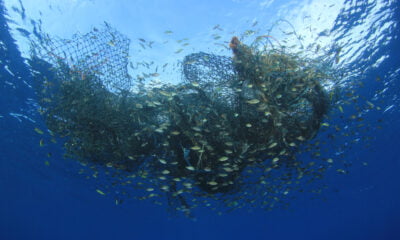

Environment
Report Urges Investors to Encourage Sustainable Fishing
Aviva Investors and the Sustainable Fisheries Partnership have collaborated to create a report on sustainable fishing and fish farming. The report suggests that investors need to do more to encourage seafood companies to improve the sustainability of the industry and reduce the risks to the environment and human rights. The report offers guidance on how investors could go about helping seafood companies to make these changes.
Launched to coincide with the United Nation’s World Oceans Day, 2016, the report argues that overfishing has significantly reduced stocks, while the demand for food production rises to cater for the world’s growing population. Given these dynamics, sustainable policies are critical to the long-term future of the seafood industry. It is also central to the financial success of individual companies because social and environmental risks can damage their profitability at any stage in the supply chain.
There is much at stake. According to the United Nations, the livelihoods of over three billion people depend on marine and coastal diversity, and 2.6 billion people count the oceans as their primary source of protein. The market value of the world’s marine and coastal resources is estimated at $3 trillion per year, or around five percent of global GDP.
Rapid and unchecked expansion has already proved disastrous for the Chilean farmed salmon industry. First gaining public attention in June 2007, Infectious Salmon Anaemia spread quickly through supplies, not helped by large concentrations of salmon pens that facilitated the transfer of the disease. New practices and legislation have been introduced, but this was too late for the farmers that lost billions of dollars in revenue following the contagion.
The Thai seafood industry has suffered reputational damage in recent years through extreme violations of basic human rights for workers on its fishing vessels. Consumer-facing brands in the US and Europe that buy Thai seafood have had to work hard to retain the confidence of customers that their products are not associated with people trafficking and slavery.
United Nations statistics about global oceans can be found here.
The report highlights ways in which investors can positively engage with companies and steer them towards more sustainable strategies to improve business performance and minimize environmental and social risks.
UN supported investor group Principles for Responsible Investment (PRI) is lending further support to the aim through a collaborative engagement campaign with an initial 10 companies. Aviva Investors, Robeco, PGGM, BMO, Legal & General and Öhman are among the investors supporting the initiative.
The report advocates the following action by investors:
- Laying early foundations for responsible policies: Investors should work with companies to formulate and adopt a responsible seafood policy from the outset of the association. This should demonstrate a commitment to continuous improvement and transparency, with ambitious targets for the future.
- Influencing the supply chain: Investors should encourage supply chain companies to ensure producers avoid fish that are illegally caught; support well-managed fisheries and fish farms that are certified to credible standards; support the responsible management of aquaculture resources across regions; and encourage fisheries that are trying to improve.
- Ask material questions: The report sets out questions investors should put to companies to gauge the level of responsibility and sustainability already built into their operations and to ascertain areas for development.
Abigail Herron, Head of Responsible Investment Engagement at Aviva Investors, said: “During engagement, the business case for sustainable fisheries should be made from an environmental, social, governance and financial perspective. Bribery, corruption and a rabbit hole of shell companies often go hand in hand with illegal, unreported and unregulated fishing. Given the rapid and continual decline of fish stocks, many current fishery practices and management systems are simply not fit for purpose and need to be urgently addressed through engagement.”
Jim Cannon, CEO of Sustainable Fisheries Partnership, said: “Working to achieve sustainable sourcing is an essential activity for any company that uses marine resources and an important indicator of responsible behaviour. Sustainable Fisheries Partnership is actively supporting transparency in the seafood industry as well as advising companies on creating, implementing and communicating sustainable sourcing policies.”
Fiona Reynolds, Managing Director of the PRI, said: “A rising world population means that producing food in sustainable ways is absolutely vital. Investors can play an important role in engaging seafood companies on their environmental and human rights impacts, and, in so doing, help to ensure the sustainability of food production both now and for the benefit of future generations.”


 Environment12 months ago
Environment12 months agoAre Polymer Banknotes: an Eco-Friendly Trend or a Groundswell?

 Features11 months ago
Features11 months agoEco-Friendly Cryptocurrencies: Sustainable Investment Choices

 Features12 months ago
Features12 months agoEco-Friendly Crypto Traders Must Find the Right Exchange

 Energy11 months ago
Energy11 months agoThe Growing Role of Solar Panels in Ireland’s Energy Future




























